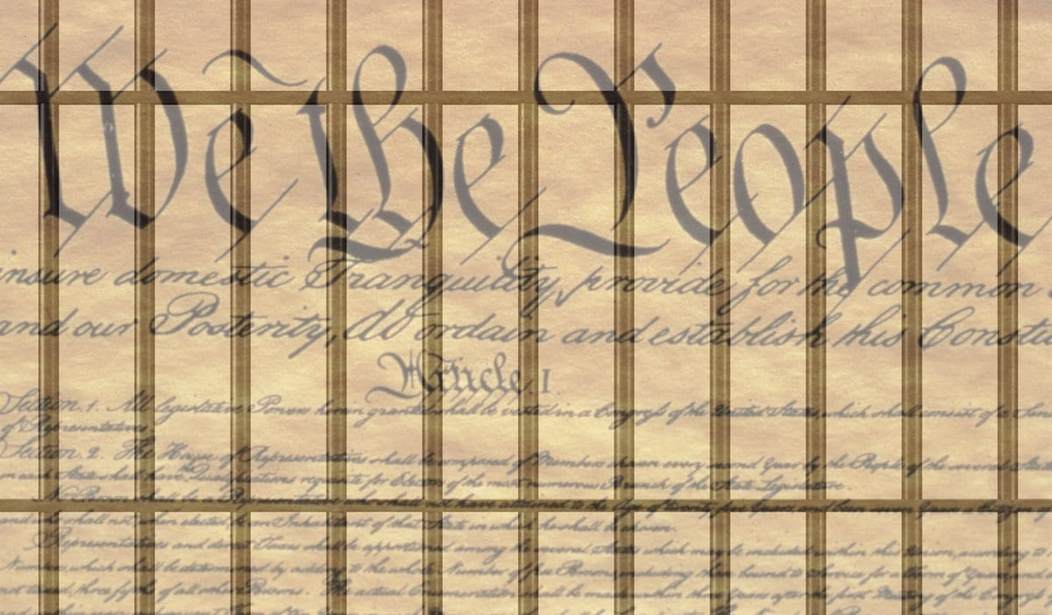On Wednesday, Alliance Defending Freedom (ADF) filed suit against Kellogg Community College (KCC) in Michigan on behalf of students who had been put in jail for exercising their First Amendment rights. The students, who were handing out pocket copies of the U.S. Constitution with Young Americans for Liberty (YAL) in September, were arrested and put in jail for “trespassing.”
“All public colleges — which are supposed to be the ‘marketplace of ideas’ — have the duty to protect and promote the First Amendment’s guarantee of free speech,” declared ADF Legal Counsel Travis Barham in a statement on the case. “Ignoring this duty, KCC arrested these club supporters for exercising this freedom, and, ironically, for handing out copies of the very document — the Constitution — that protects what they were doing.”
Not only did KCC set up and enforce a “speech code” which violates the First Amendment, but the college also refused to apply this code to other organizations, such as the LGBT group Spectrum, according to the lawsuit. This kind of blatant ideological discrimination is unacceptable, as is the campus trend of regulating free speech to certain “zones.”
The unlawful jailing happened on September 20, 2016, according to the lawsuit. On that date, KCC students Brandon Withers and Michelle Gregoire were handing out pocket Constitutions, along with Isaac Edikauskas, vice president of the YAL chapter at Michigan State University, and Nathan Berning, a field representative at the Leadership Institute. The four intended to recruit students to join the budding YAL chapter at KCC.
At first, an administrator came by, informing the group that they needed a permit to “solicit” on campus and that they needed to go into the Student Life building and reserve a table. When Gregoire explained that this was their First Amendment right to speak and hand out literature, the administrator said it would be fine. Five minutes afterward, however, Drew Hutchinson, manager of student life at KCC, came by and asked them to shop.
“Do you like freedom and liberty?” one of the students asked a passerby. Hutchinson attacked this conversation-starting question as “provocative,” and insisted that this question obstructed students’ access to education.
Revealing a classist bias, Hutchinson added that students from “rural farm areas … might not feel like they have the choice to ignore the question.” He noted that many students “are growing up on a farm, or they don’t have wifi, they don’t have internet, you know it’s a very different situation.” This paternalistic approach is offensive, as is the notion that students who grew up on a farm need to be “protected” from the Constitution.
After Berning told Hutchinson that he and his colleagues had a First Amendment right to speak there, the director of student life stormed off.
During this time, the YAL members were only speaking to those who were interested, and did not bother students who did not want to listen. Indeed, in a time span of about two hours, more than twenty students had signed a petition indicating an interest in becoming a member of YAL at KCC.
Nevertheless, after a security guard came and left, Harold West, chief of public safety and director of student relations, arrived and threatened Withers that he would be arrested if he did not leave campus. Withers left the group, but the others kept passing out Constitutions and getting signatures.
At approximately 2:45 p.m., West and other security officials arrested Berning, Gregoire, and Edikauskas, handcuffing them and charging them with trespassing on KCC property. They then took the three to the county jail, where they waited seven hours before being released after posting bond.
In a show of cowardice, the county prosecutor dismissed the criminal charges against the three of them on November 30, but the lawsuit makes no mention of an apology, either from the county or from KCC, to the three people they wrongfully arrested.
In the lawsuit, ADF, Gregoire, and Withers attacked the college’s speech policy, which KCC refers to as a “Solicitation Policy,” as violating the First Amendment. The policy regulates a wide variety of student expression, including leafleting, assemblies, speeches, and circulating petitions.
The lawsuit also declares that Gregoire and Withers are entitled to “monetary damages and equitable relief.” I would think so.









Join the conversation as a VIP Member